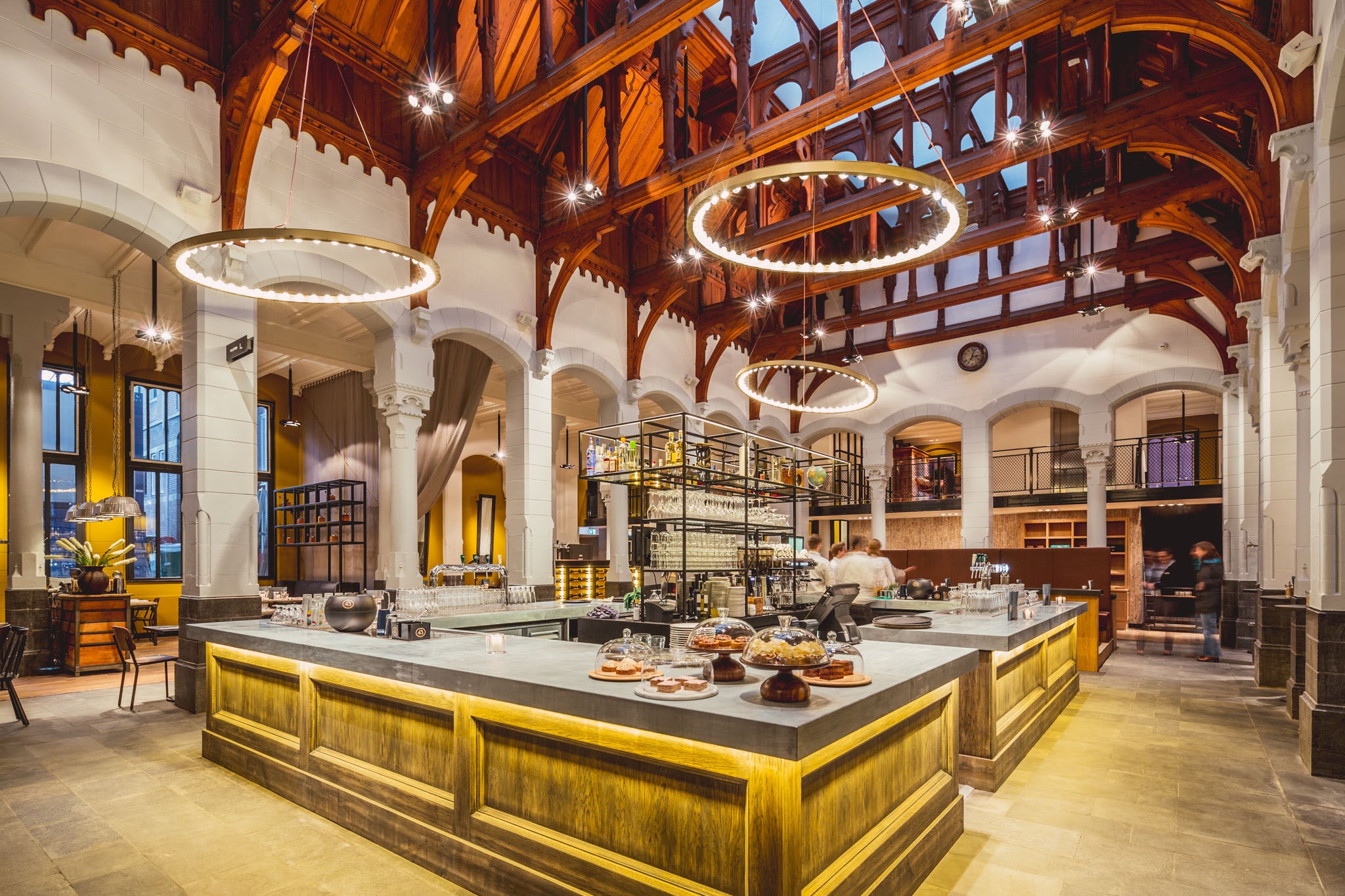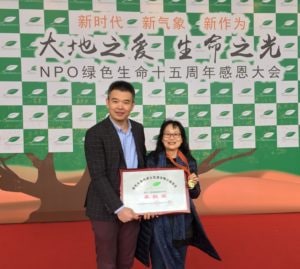
1: Magnificent Magnolia
From a neglected historic building to a beautiful boutique hotel. Emily Lewis reports on a UNESCO award-winning project in Santiago, Chile
Hotel Magnolia stands triumphantly amid the bustling streets of Santiago. Envisioned as a space that would combine Santiago’s history and its future, renowned architect Cazú Zegers explains the aim of the restoration. “We wanted to bring out the tradition, and from that tradition reveal a dialogue between the old and the new,” she says.
The project entailed converting a listed three-storey mansion, dating from 1929, into a 40-bedroom boutique hotel, complete with two bars, a dining room and a full kitchen. Owner José Villanueva believes the restoration of Hotel Magnolia could set the trend for revitalising historic buildings in Chile, turning them into centres of hospitality and culture.
 In 2017, the experts behind the renovation of Hotel Magnolia received the UNESCO Grand Prix award from United Nations Educational, Scientific and Cultural Organization (UNESCO) for their renovation of the historic building.
In 2017, the experts behind the renovation of Hotel Magnolia received the UNESCO Grand Prix award from United Nations Educational, Scientific and Cultural Organization (UNESCO) for their renovation of the historic building.
The winning team included Zegers, Villanueva, and William Taunton FCSI of the Santiago-based foodservice consultancy Gastrotec. Taunton recognises the accomplishment in receiving this prestigious accolade. “How many projects are developed every year in the Caribbean, Central and South America? Hundreds, I guess, and this is a small boutique hotel in downtown Santiago,” he says.
Challenges and restrictions
The main challenge for the Magnolia team was space. The physical restrictions of working in a tightly packed Chilean city were compounded by the legal restrictions of working with a heritage site. These limitations became increasingly pronounced in areas where practicality is necessary, such as the kitchen and dining areas.
Taunton recalls the difficulties. “There were problems, like the size of the kitchen and the health department requirements in such a small space.” Ultimately, Gastrotec were able to create a fully functioning kitchen, keeping equipment and design simple and straightforward.
As well as being the owner of the building, Villanueva was also the engineer, working closely with Gastrotec on the foodservice aspects of the hotel. “José Villanueva, has several properties, but this one seemed to be his baby,” says Taunton.
The Hotel Magnolia project allowed those involved to show off their skills. Working in a restricted space Taunton, owner Villanueva and architect Zegers had to find unique ways to resolve challenges. Waste disposal, health and safety regulations and innovative design aesthetics were all combined into the team’s desire to create a space that meant something.
“To do a very human project, with all these restrictions, has been very interesting,” says Zegers. Her accomplishment is increasingly significant with the discovery that her great uncle was the original architect of what is now Hotel Magnolia.
Taunton’s reflections on the project reveal the accomplishment that is Hotel Magnolia. “We never expected much. The project was small and complex. But when Cazú took control it was a surprise. I think that is why she won the award.”
Emily Lewis
2: Making a difference
While individual FCSI members frequently receive awards throughout the year for their own groundbreaking projects, FCSI is also honoured for its pioneering work. Michael Jones reports on an award-winning initiative led by Clara Ming Pi FCSI
On 18 November 2017 FCSI was granted the Dedication Award by the non-profit organisation Green Life for the annual tree donations and tree-planting activities FCSI Asia Pacific Division has undertaken in Inner Mongolia since 2008. Clara Ming Pi FCSI, former chair of FCSI Asia Pacific, received the award in Shanghai, China, on behalf of FCSI.
 Celebrating its 15th anniversary Green Life is a non-profit organisation promoting environmentally friendly initiatives in the public interest. It was established in March 2003 when it was formally recognised by the Japanese government.
Celebrating its 15th anniversary Green Life is a non-profit organisation promoting environmentally friendly initiatives in the public interest. It was established in March 2003 when it was formally recognised by the Japanese government.
Green Life receives donations from individuals andcompanies in China, Japan, US and other countries to aid people living in KuLun Qi in eastern Inner Mongolia to plant trees to help improve local living conditions by controlling sand storms and protecting their ecology.
2017 was FCSI Asia Pacific Division’s ninth year contributing to this initiative. The division worked hard to encourage donations from members of FCSI and its partners to raise money for trees to be planted in eastern Inner Mongolia in June 2017.
A history of dedication
“The FCSI 2008 Beijing Conference was the first carbon-neutral event held by FCSI,” says Pi. “Corporate airplane travel is one of the biggest contributors to global warming. We committed to offset carbon emissions caused by our conference attendees. That year we participated in a Tree Planting Program by JGI (Shanghai) through Green Life.”
This initiative was chosen, says Pi, because trees planted in Inner Mongolia would help prevent the advancement of the desert and stop sand storms affecting northern China, Korea, Japan and even impacting the west coast of North America.
“It was appropriate for FCSI to contribute to environmental protection in this part of the world,” she says. “A total of 500 trees were planted in Inner Mongolia in the spring of 2008. This was one brave step forward for FCSI, embarking on our journey and commitment to save our environment and our planet. Our tree planting effort resulted in improvements of the local eco-system and helped raise living standards for the local farmers,” says Pi.
The action gained the support of the FCSI membership so FCSI Asia Pacific decided to continue annual tree planting activities directly with Green Life, with thousands of trees now having been planted.
“We firmly believe that by participating in the Tree Planting Program, not only can we spread the concept of environment protection, but also sustain our passion for such causes,” says Pi.
For those interested in contributing, funds can be donated directly to Green Life Foundation or to the FCSI APD Tree Planting Project. Proceeds are sent to the Inner Mongolia Youth Foundation and are then forwarded to the local youth league for the specific tree planting project.
“Through Green Life we hope that, with our efforts, the forest coverage rate in Kulunqi will reach 40% in 15 years, thereby reducing sandstorms in Inner Mongolia, and that 40% of the land can be recovered and converted into arable land for agricultural use,” says Pi.
Further details:
If you are interested in supporting FCSI’s Tree Planting Program or becoming a volunteer, please contact:
FCSI Asia Pacific Tree Planting Program
APD Secretariat
Suite 901 Level 9, The Hong Kong Club
Building
3A Chater Road, Central, Hong Kong
T: 852 3125 7631
apd@fcsi.org
3: The heart of the hotel
The Post-Plaza in Leeuwarden, the Netherlands, won FCSI EAME’s 2017 Excellence in Foodservice Design award for Gerben van der Molen FCSI
For Gerben van der Molen, the best thing about winning the Excellence in Foodservice Design award at the 2017 FCSI EAME Conference in Vienna, Austria, was “the recognition” it gave both the project and his team. “It meant as long as you produce high-quality projects, you don’t have to be the biggest design company to compete with the best of the world,” he says.
For van der Molen, founder of Stars Design in Rotterdam, the Netherlands, the Post-Plaza project in Leeuwarden he and his team worked on over a two-year period was a real labour of love.
The historic old post office in Leeuwarden, originally constructed in 1904, was completely rebuilt and expanded into the Post-Plaza hotel, with van der Molen and his team leading the foodservice design The heart of the hotel element throughout. “It took us two years in total, one year of designing, one year of construction,” he says.The hotel opened in January 2016. “We chose to create a kitchen in the heart of the operation to show the guests what the chefs were cooking. We wanted them to interact.”
Guests can view the kitchen from a mezzanine level. The kitchen has a central stove, from which all the other equipment is integrated.
Communicating quality
The chefs at Post-Plaza hotel prepare everything fresh with a lot of locally produced products. The new kitchen therefore, “is a great way to communicate with your guests about the quality being served,” says van der Molen. “We wanted to make the distances that waiters walk as short as possible. This is good for the food on the plates, the staff and overall efficiency – meaning costs.”
The Post-Plaza’s 160-seat Grand Café is a 19-hour-per-day operation, opening at 7am with breakfast where guests can order freshly made dishes such as eggs or pancakes from the chef at the counter. After breakfast, people come in for coffee and the hotel’s home-made pies. “The coffee is house roasted,” says van der Molen.
 He is particularly proud of the design for the hotel’s island bar. “It was designed as two fully operational bars, making it easy to upscale staff when it gets busier. It’s the result of great communication between operating staff, designers, project management and the kitchen supplier during the design phase.”
He is particularly proud of the design for the hotel’s island bar. “It was designed as two fully operational bars, making it easy to upscale staff when it gets busier. It’s the result of great communication between operating staff, designers, project management and the kitchen supplier during the design phase.”
During construction van der Molen’s team faced challenges that are inevitable with old buildings. “The building is a protected monument. That could have made the project more expensive, but by using simple solutions we kept it within budget,” he says.
Stars Design has worked for more than 20 years with the hotel owner, Hoscom. “We have designed all their hotels. In most cases we are involved at the very beginning, just after the building has been bought. With this project, the biggest challenge was to make a hotel with rooms for an international audience but also locals,” says van der Molen. “It’s a unique hotel. An American guest, who travels a lot, said the hotel was in their personal top three hotels of the world. On this project I learnt that when everybody keeps to their role in the process and respects one another, you get the best result.”
Michael Jones
Further reading:
Foodservice Consultant‘s Review of 2017 can be viewed here.
